Speaker pictures courtesy of Rachid Molinary, whose Flickr photostream of the event is a joy to behold.
Imagine a major event, the first of its kind in your neck of the woods, one that inherently focuses on ideas put into action. And you are chosen to be the first speaker, the lead-off hitter that has to get on base.
So give it up to Justo Méndez, founder of Nuestra Escuela, who was given the privilege of being the first TEDxer in San Juan, the first of what we hope will be hundreds.
Justo, a calm, more-salt-than-pepper in his hair, spoke in his measured rumble about the school his daughter Ana Mercedes asked him to establish, a school where kids from disadvantaged backgrounds, the ones left behind by the system, could find themselves, regain their dreams and achieve.
The more poignant point in that story? Ana Mercedes was taken from Justo and the Méndez family over 14 years ago, in a tragic auto accident. Self-describing that period as one where he truly questioned staying alive, Justo soldiered on as the dream of a school that could help others dream became his goal.
Nuestra Escuela interviews potential students, a fairly lengthy process where the school's staff looks for those teenagers who are willing to commit, not just in words, but in deeds. Those that show they can and want to receive a support system beyond classroom work, involving specialists whose only goal is to move beyond the student's dream to making it come true.
Nuestra Escuela is not a regular school; that's obvious. Sadly, the average school focuses on nothing more than a number, be it some useless "standard" or "bottom line." What Justo has created and operates places Nuestra Escuela's focus on what education's truest goal has always been: self-improvement.
Fernando's strongest and most cherished childhood memories are of being on a farm, of spending time in Nature with plants, animals and the people who loved both. After a successful career he defined as being the basis of "happily ever after," his love of the land, our land, made him tackle the huge task of saving it.
The numbers are staggering in their implications: Puerto Rico has more than 1,000 people per square mile; only 8% of our land is used for agriculture and what land we have left is threatened by atrocious planning and (though Fernando didn't bring this up), greed.
Keeping the tenets and warnings of 1972's "The Limits of Growth" in mind, Fernando created the Fideicomiso de Conservación, the Conservation Trust of Puerto Rico. Battling a monolithic government and prevailing socioeconomic trends, the Trust has rescued over 2,000 acres, land that will forever remain as pristine as possible.
Fernando's goal of reasonable and sustainable land use would have Puerto Rico dedicate 1/3 of its land for human habitation, 1/3 for agriculture and the remaining third as a natural preserve. The division sounds possible at the far reaches of current imagination, but the reality behind its logic is inescapable: we cannot sustain our current misuse of land. The Conservation Trust leads the way in ensuring that our future will be a bright--and survivable--one.
And on a personal note, maybe we can consider using Ponce as parking...
Jorge Rigau is an architect. He sees the world as an ongoing project that can be improved, rebuilt, combining function and art in bold ways. In that spirit, Jorge presented two proposals, each using elements that already exist and transforming them into so much more.
The first would "rescue" spaces throughout the San Juan area, those urban and suburban nooks and crannies that serve as little-known gems, by adding a small amount of work (eliminating gates, adding shade trees, a few benches, improved pavement, more lighting, signage, etc.) and combing these spots with urban transit (train and buses) to create an Urban Pathway, a Vereda we can explore.
Jorge and his colleagues have identified enough San Juan gems and developed a economic restructuring plan that could create some 3,000 miles of potential paths, a number that simply staggers the mind for it means that San Juan--for us--is largely unexplored.
The second project repurposes roughly 22 miles of irrigation canals that run east-west through a variety of lands in the northwest of Puerto Rico. Jorge joined forces with the Municipality of Isabela and a local high school's tourism marketing program to develop a one-mile tour of the canals, not only exploring their reason for existing, but also the natural environment they are in. The pilot project attracted more than 2,000 visitors, but has yet to be made a permanent project.
The canals, owned by the local Power Authority and off-limits to the general public, can thus become tourism attractions, passive recreation mini-parks (think floating in an inner tube...) that highlight the beauty of Puerto Rico's natural landscapes.
Puerto Ricans often ignore the beauty that surrounds us. Jorge Rigau and his colleagues are showing us that we do so for no good reason at all.
Daniel is a scientist, with a resumé you'd see in a bio-thriller novel. His presentation starting point was this: In prehistoric times, about 40,000 years ago (think Neanderthals, for a visual), life expectancy was 30 years. In 1900, with civilizations criss-crossing the globe, life expectancy was...30 years. Humans had made much progress, from calculus to the cuckoo clock, but life expectancy for the average Joe and Jane was the same as for the average Ook and Chook. (Like we know what Neanderthals called each other...)
But life expectancy more than doubled in the 20th century, with the average Juan and Juana in Puerto Rico expected to live 76 years. What changed? Daniel points to two major factors: antibiotics, based on the work of Alexander Fleming, who discovered penicillin, and vaccines, based on the seminal work of Jonas Salk that helped eradicate the terrifying scourge of polio.
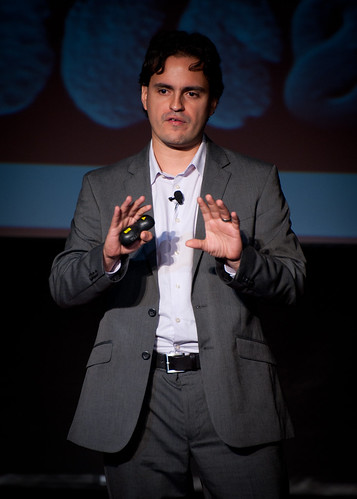
At a time when politicians, mostly Republicans but joined by other stupid people amongst the Democrats, question research into fruit flies, tiny worms, mosses and other such "trivia," Daniel points out that one basic change in how science was done has made the enormous difference in the past century, not only in life expectancy, but in all aspects of society: public funding of basic research.
Fleming didn't set out to discover penicillin: he was simply classifying traits of staphylococci bacteria. Salk was commissioned to simply find out how many different types of polio virus there were. Neither man was aiming at a "higher" goal, until basic research, the process of unlocking simple mysteries, led to opportunities for great public good.
Daniel, founder of CienciaPR, studies the neurological development of nematodes, tiny (very tiny) worms. It is basic research. It is not aimed at solving major health care problems or conquering diseases or launching a multi-billion global industry or changing the way the world actually works.
Yet.
When you, as a daughter or son, go off to college, you expect the major changes in Life to happen to you, not to your parents. Tara went on to become an architect, but her mom went from urban/largely passive/jobholder to rural/health conscious/organic farmer. On the scale of change, Tara's mom definitely won.
Exploring this strange new world and hoping to help her mother expand awareness and success, Tara began discovering the joy of fresh foods, plunging with a little trepidation into produce she'd never tried, recipes she would have never conceived and a lifestyle that had very little in common with her past. Speaking with farmers and enjoying the fruits of their labors and experiences, Tara quickly filled a niche for her new friends: marketing and distribution.
The concept is simple in theory, damn hard in practice: form a distribution network that allows the farmers to concentrate on production, while still getting a good price for their crops, reaching consumers in an effective and efficient way. Tara was able to do that by creating Food Box deliveries, colorful plastic (recyclable) containers delivered once a week or more often to consumers, with a variety of fresh produce. Building by word of mouth, extensive contact with farmers and consumers and basic good neighbor policy, the Department of Food has grown to become a strong and burgeoning community.
For that is what it is: a community. One that shares recipes and experiences, tips and techniques and sees food as more than just a consumable product, but as the basis of a lifestyle more natural and fulfilling than our current "fast food, junk food, no time for real food" unhealthy obsession.
Tara is building a community with a lifestyle rich in sharing. How many of us would love to be the architects of something like that?
Jorge Gaskins: Microalgae for Food and Fuel
Pond scum. No, not you, just the very fact that the following is about what we often call pond scum, that greenish, icky layer that invades pools of water, including backyard pools that lack enough chlorine. Why is this scum more important than other scum (such as politicians)?
Simple: because it is a renewable biofuel source of enormous power...that can also feed us.
Microalgae grow in every ecological niche on the planet. They grow quickly, needing just an aquatic environment and carbon dioxide to grow. And as for their potential as fuel, well, that's just off the charts...literally. Microalgae produce 10,695 gallons per acre per year of biofuel, comparable to diesel. The second-best producer per acre per year is sugar cane...at 700 gallons.
Look at that again: 10,695 to 700. And microalgae are about 15-25% protein as well.
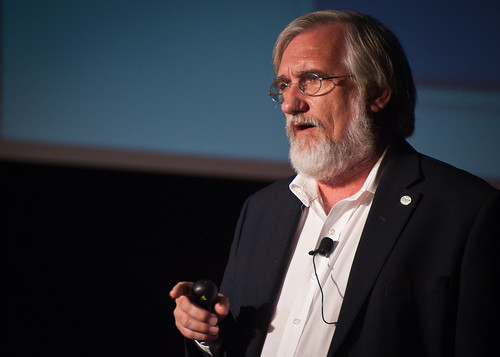
Jorge indicated that there are some 40,000 acres of salt-tinged land along Puerto Rico coastlines, land that cannot be used for traditional farming. If that "useless" land were converted to microalgae farming, Puerto Rico could produce 20% of its power generation fuel with barely 2% of its total land mass (that isn't producing anything now.)
The world is approaching a food crisis as global warming and water depletion make large-scale farming increasingly difficult. Puerto Rico needs more agriculture to offset a 92% food import rate and a 14-day food supply within our shores. And since Puerto Rico imports 99.7% of its fuel, a solution that doesn't involve digging a 92-mile trench through sensitive (and occupied) lands in order to import natural gas makes tons of sense.
Pond scum. Bet it looks different to you now...
Imagine a small high school in the very rural mountains of western Puerto Rico, in a town where unemployment and poverty are the norm, not the minority. The school is plagued by fighting, teenage pregnancies, drugs and rampant absenteeism, both amongst students as well as faculty. The school needs a principal and gets a former gym teacher.
Then it gets an official letter, notifying the school that unless it can pass the local standardized tests, the school will be closed permanently. Students will have to travel an extra hour or two to get to their new school (one already gets up at 4 AM to be at school by 7:30), teachers will lose their jobs and the town will receive yet another devastating loss.
The school has failed the tests, abominably, for nine straight years. It has to pass now or face the unthinkable. And it has only 60 days to make success happen.
That was the challenge faced by the Urban High School in Maricao, a tiny town in the mountain region of western Puerto Rico. Its new principal, Hebé Pérez Figueroa, had succeeded in proving herself and making some changes, but to reverse a 9-year trend that saw the school at the bottom of the pile? (In Sciences, the school had a 2.6% pass rate.) In 60 days?
Hebé took failure out of the equation. She laid the situation out to her faculty and they responded. They went out to the community, to the parents, and told them what was needed. They stepped up. And the school selected 16 students to lead the charge to passing the tests, becoming 17 when one of the "marginal" students literally voted himself onto the team.
Working together, with almost 5,000 hours of collective effort, the Maricao 17 did what few schools in Puerto Rico do: they passed every test. The 17 are now in college, thanks to scholarships from the Ana G. Méndez University System and this year's team, the Maricao 19, were on stage with Noel and Hebé, to a well-earned and lengthy standing ovation.
And few dry eyes in the house.
Lawrence La Fountain-Stokes: Puerto Rican Sexiles
Exile, voluntary or mandated, is a soul-crushing experience. You are being ripped from what you know, from what formed you, to enter a different world where what caused your exile in the first place might still be rejected in the second.
Lawrence, author of "Queer Ricans: Cultures and Sexualities in the Diaspora," spoke about having to leave your home because of rejection of homosexuality, of how cultural attitudes of intolerance force a person to find a new home, but with no guarantee that the new one will be any more tolerant than the old.
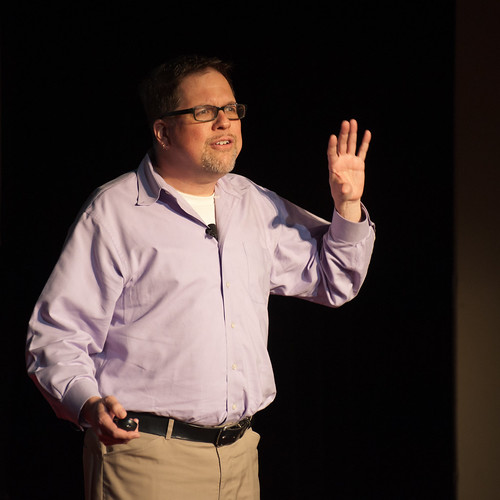
Tracing a quick and insightful path through art, Lawrence shared examples of how art--particularly literature and theater--had sought to explore and express this sexile experience. Using excerpts from stories, poems and musicals, the accepting/defiant nature of those looking at or living sexile was revealed.
Rejection of homosexuality (or acceptance) is largely cultural. The macho attitude of Latino culture sees homosexuality as a fata weakness, a degeneracy or a disease, when at heart it is simply a part of human expression. To be rejected for what you are, whether its your sexuality or skin color, causes pain, rage and a desire to tell the world "I am not wrong: I am me."
Lawrence captured the whimsy, the playful nature of this sexile response by indicating that theater in New York, with its large Puerto Rican population, had created several works with "gay" twists, including an adaptation of "The Wizard of Oz." He sang a portion of the new lyrics to "Somewhere Over the Rainbow," eliciting chuckles at their gentle wit and breathless respect for his courage to be there, alone on stage, heart on his sleeve.
More than what Lawrence has said (which is very important) was simply the fact that he was there saying it. Not a week had passed since the local senate had tried to exclude the LGBT community from "hate crime" laws, not only a vicious hate crime in and of itself, but a stupidly useless exercise of an autonomy we do not have. The cowardice of the senate was in stark contrast to the shining examples Lawrence shared. May we have more examples like his and less of the hateful kind.
If you are not a parent, skip this section and go to the paragraph that begins with "Andrea is an example of clear insight into one's self."
Imagine your talented, intelligent and attractive child, who is doing community work in Miami, calls you up to tell you that the effort feels hollow somehow, and that the next step is to sell everything and go try to make a difference in Sudan. Sudan, the east African nation where Darfur happened and is happening, in the midst of an endless civil war. Imagine your child telling you and then try, if you can, to imagine why they would do it.
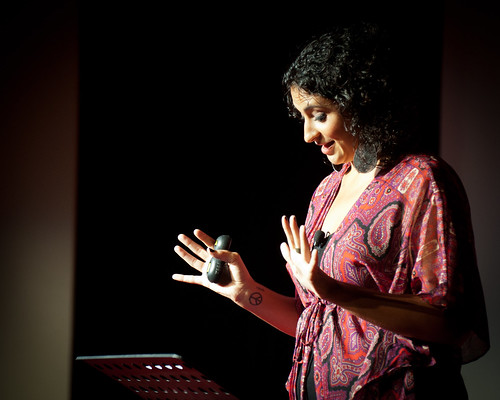
Andrea is an example of clear insight into one's self. Almost all of us pretend to look inside ourselves and be honest with what we see and feel, but deep down, we know we're cutting ourselves some slack, we're ignoring clear signals, we're lying to ourselves. Despite the kind of open-hearted generosity that too few of us actually put into practice, Andrea felt she could do more, that in fact, she had to do more. So the Sudan was her next challenge.
In a moment every loving parent could identify with, Andrea narrated how an e-mail that basically said "I have a little malaria, but I'll be okay" unleashed a frantic and successful effort to find a private plane to bring her from halfway across the world closer to home. Andrea thought that was crazy; true parents know it was not, that we'd do more if we had to.
But Andrea refused the plane unless it took the children who were sicker than she was. In a moment I could relate to very well, she wondered why she was lucky and they--the kids in Sudan--weren't. And her essential premise, that it isn't really better to give than receive, came to full light in her moving presentation.
Giving, like so many of us do routinely or in crises, is good; to continue giving with no idea of what it is doing to the receivers is wrong. It creates dependency. It is giving fish when teaching how to fish is needed. In that spirit, Andrea founded Silent Grace, building sustainable development in Haiti. Giving with the receivers, not to them; giving from the heart and hands instead of from merely the wallet.
Andrea opened her eyes. We should open ours in the very same way.
Giovanni Rodríguez: The Second House
Giovanni is of Puerto Rican descent born in New York, what he calls a Neo-Rican. Cool. But where he's going with this is even cooler.
What transformed this shy, bookish, almost self-isolated man into a visionary building a new Latino future? Social media, or to use his preferred term, social engagement.
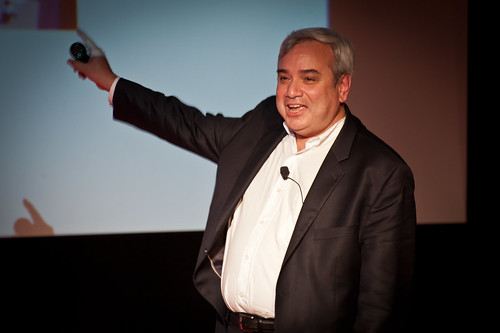
To anyone who knows Latinos even a little bit, it is obvious that we engage each other more so than other cultures. Social media, in the form of Facebook, Twitter and such, are not "arms-length tech tools" to us, but simply digital manifestations of our normal way of socializing. As Giovanni noted, we are the fastest-growing segment in social media...and the largest minority in the U.S.
What became evident in 2008 was the power of the Latino vote. Not that the Latino vote is homogenous, but that it is large, definitely large enough to swing every major election from now on. Social engagement becomes the new toolkit to galvanize involvement, to bring Latinos together to change the current posture in U.S. politics, from "waiting for them to come to us" to "we expect you here tomorrow," a new form of political mobile crowdsourcing.
So Giovanni sees we can reframe political messages and topics, enhance the potential of public-private partnerships and most importantly, use analytics to dig deep and wide into Latino trends, tendencies, tastes and topics.
The Second House is Giovanni's way of saying that the White House and Latinos can create a second "nexus," using the metaphor of the roaming Christmas party Puerto Ricans call parranda to illustrate the "coming together" this Second House could be. Latinos engaging with each other and with their increasing role as participants in government portends a manifestly different future for the U.S., one we can begin to observe and influence with social media.
¡Parranda!
Mayra Santos-Febres: We Have to Tell Our Stories
There are some things a sex symbol can say that other people can't... Mayra is more than all woman: she's a writer of deft style, powerful emotions and insightful eye. A professor at the University of Puerto Rico, she speaks often and eloquently about the island's issues, and also about its soul.
Although it seems self-evident that a writer would love words, not all writers--and those pretending to be--love them. For true writers such as Mayra, words are air and blood, ambrosia and nectar, shield and spear. For Mayra, eschewing words is tantamount to denying life, love and history. That is why she stood on stage and urged Puerto Rico to lose its fear of literature, to lose its fear of reading because in that fear lies the other deadly sin we commit: we do not write our stories.
As Mayra stated it with deft charm, the sharing of stories is the sharing of emotions, of life, of times and thoughts that add to the collective. By reading, we become more--not less. We gain from our reading, we augment who and what we are. And yet Puerto Ricans by and large look at reading as a mirror that diminishes the reader instead of a window that grants sights of new horizons.
Because of that fear, we trivialize our chances and abilities to write our own stories. We believe that our particulars are not universal, when in fact, they can't not be. We dismiss reading and avoid writing and in so doing, we fail to see and understand that we harm and diminish ourselves...and the world.
No one can replace our stories. Only we can write our stories. Mayra said it clearly: our stories are needed. It is our responsibility to share our consciousness with the universal.
Mayra and several other writers lead the way. Where they go, we don't have to follow: we can set our own paths. But whether we follow or lead is not the important thing: the important thing is to act, to write, to accept the responsibility of putting our words in front of the world.

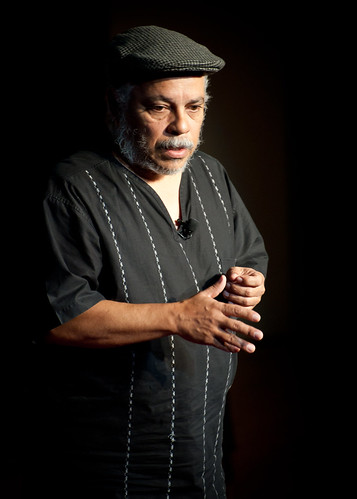
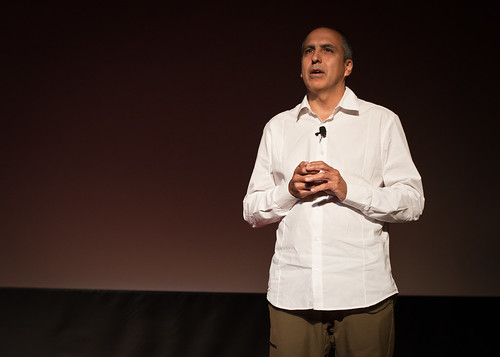
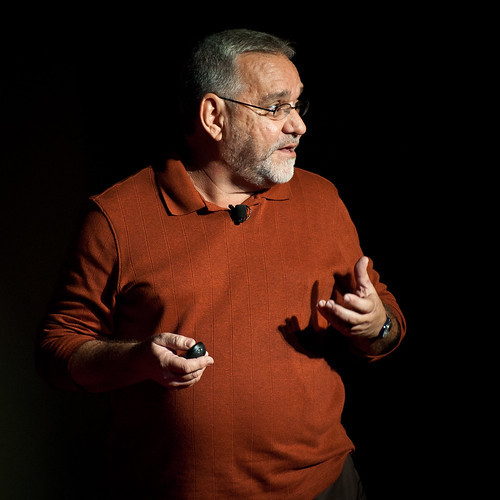

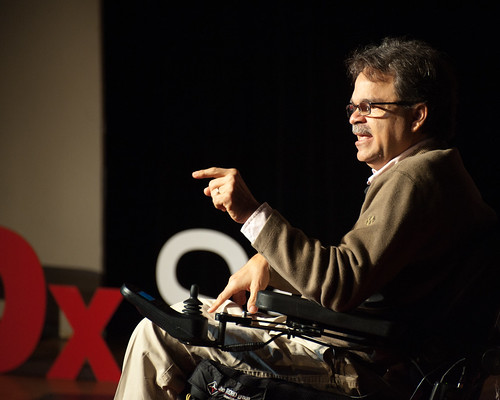
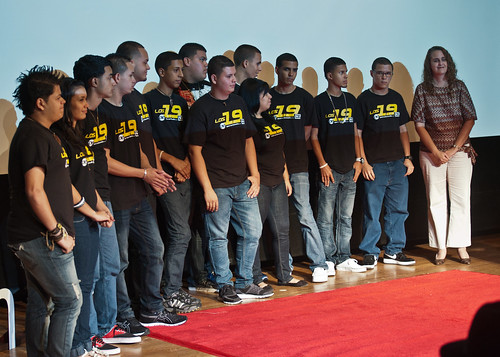
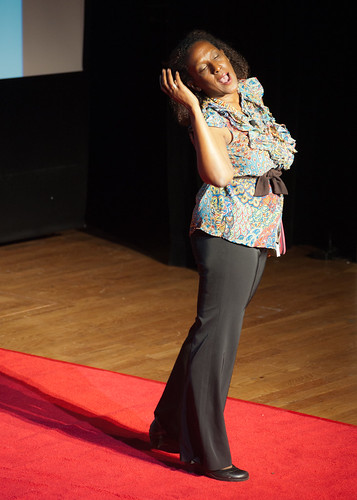
5 comments:
Thank you for your review. It is quite faithful to the talks, and I love your writing style. How much inspiration!
¡Feliz Navidá!
Thank you. You are very kind. ¡Felicidades!
Gil, thanks for this post. It's simply amazing. Either you take the best notes ever or you have one heck of a memory. In any case it perfectly summarizes what happened during TEDx.
Also, thanks for dropping by my blog.
I enjoyed your blog and have added it to My BloggerRican reading.
I'll unhumbly (I just made up that word) claim an excellent memory, for I was so intrigued by the presentations that I barely took notes.
Thanks!
Spectacular summary. Thanks for taking the time to share it with everyone. Looking forward to our pending conversation.
Post a Comment